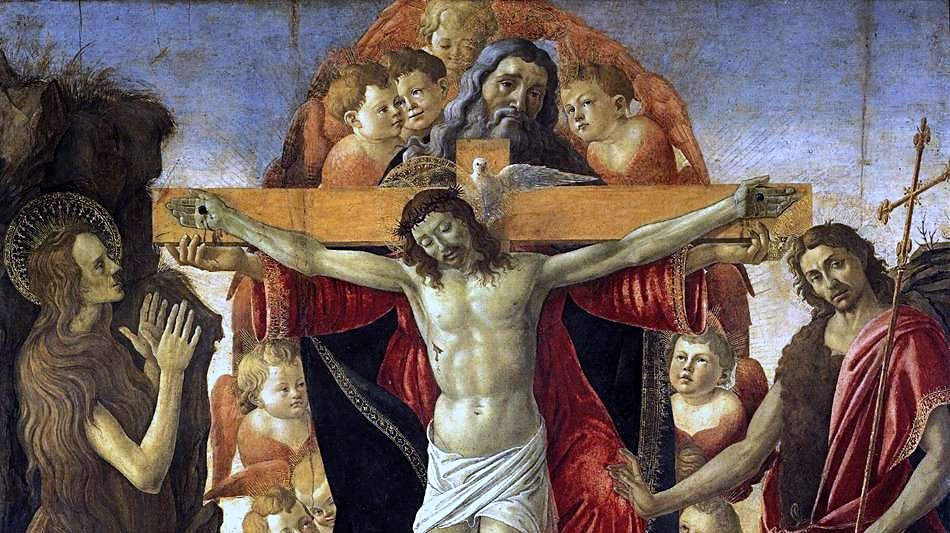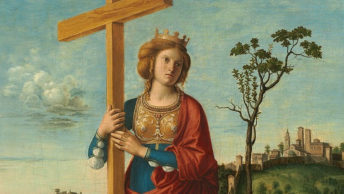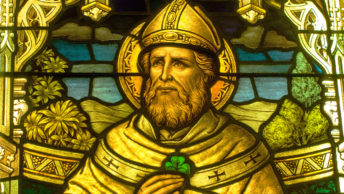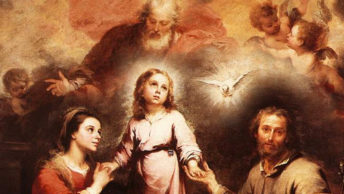Every year, the Catholic Church feels the need to tackle the toughest mystery of our faith, the mystery of the Holy Trinity, as a way for us to remain aware of our smallness coexisting with our unfathomable greatness within God’s embrace. It is the need that pushes us to fix our gaze, at least occasionally, into the infinitude of God and to explore it rather than shy away from such impossibility. We wonder about this lure of the infinite that makes us feel so very small, so embarrassingly inept and yet so loved by the ultimate, most perfect Being from which our very existence directly depends.
As our faith developed over time, we were taught, correctly so, that we cannot probe God’s mystery. However, we still want to find out why he loves us in spite of our insignificance, of our lack of merit, even of our repeated disobedience. However, for this to happen while avoiding self-deception we had to wait for him to reveal himself; and he had to reveal himself in a way that would not overwhelm our puny intellect.
The Book of Proverbs (8: 22-31) reveals to us how God, in his ageless and infinite wisdom, had decided to lift a corner of the veil of his mystery in order to make us sharers of his wisdom and satisfy the longing of our hearts while still within the boundaries of our human limitations. This is how we learn that from all eternity we are dealing with a God who is free to create a splendid universe out of nothingness. We find a God who desires to interact with his creatures—most of all with us human beings created in his image. We find a God establishing many covenants of love and fidelity; a God who wants to be always involved in all aspects of our life.
Thus we discover a God who calls us to life, guides us, corrects us, enlightens us whenever we are enveloped in darkness and frees us from all that oppresses us and causes us to suffer. And, risking overwhelming our poor minds, he, the one whom the whole universe cannot contain, decides to take on the limits of our human flesh and to be born as a little baby in a stable near Bethlehem.
He did all this so that he could experience, personally, what every human being from infancy to adulthood, in strength and in weakness, would feel while standing before God who is perfection itself. He did all this also so that in his flesh he could reveal as much as possible the richness of his love and his sovereign majesty without overwhelming, without crushing us.
In our audacious contemplation of the Holy Trinity we discover also a God who took the risk of creating us free so that we could love him in return with all our strengths, with every fiber of our heart. Slowly, then, as this divine revelation unfolds, we realize that by creating us endowed with freedom, our God reacts with grief whenever we choose to do wrong, yet he never leaves us so that he can assist us in breaking loose of any new shackles that our rebellious spirit might have put on us. Eventually, little by little, as it is the case with most of us, amid highs and lows, surges and lulls, impetuses and falls, we discover that he is indeed the One True God but he is also, at the same time, “bond,” “rapport,” “interaction.” He is One God in three distinct Persons equal in majesty, power and glory. And this realization is simply crucial for us who have been swept up into that divine “bond,” “rapport,” “interaction.”
We are told that there is always an open offer reserved for us as the “divine elite” that we are: in spite of our miseries and errors, with docile reliance on grace, we can strengthen the bond with the Holy Trinity and with a contrite heart we can even reenter into it. According to our situation, we can strengthen or reestablish that bond by experiencing the loving embrace of our most merciful Father. Other times we can strengthen or reestablish that bond with Jesus, our brother, especially whenever our human weaknesses and limits bear heavily on our shoulders. Finally, we can strengthen or reestablish that bond with the Holy Spirit of comfort, support and truth especially whenever we fumble about in darkness and feel unusually weak.
Yes, we, as divine elite, as privileged ones, can be always in the embrace of the Triune God. We are meant to be in it as individuals and as a people, as isolated from the rest as well as a community, in the smallness of our humble self and in the greatness of our nation, in prosperity and in the throes of failures and frustrations. Within this Trinitarian embrace from which, thankfully, it is not easy to break loose, as the veil of mystery is lifted, we contemplate the truer reality beyond the reality in which we live. It is the truer reality in which hope morphs into certainty and we begin to believe that we are meant for lasting success and assured victory in spite of everything that pains us and the number of our mistakes that embarrasses us still.
In his Letter to the Romans (5:1-5), St. Paul writes about this “truer reality” in a way made possible by and more credible in one who struggled and resisted the offer of grace for a long while.
Therefore, since we have been justified by faith, we have peace with God through our Lord Jesus Christ, through whom we have gained access by faith to this grace in which we stand, and we boast in hope of the glory of God. Not only that, but we even boast of our afflictions, knowing that affliction produces endurance, and endurance, proven character, and proven character, hope, and hope does not disappoint, because the love of God has been poured out into our hearts through the holy Spirit that has been given to us.
Our dare to probe into the mystery of our Triune God has generated in us the burning desire to enter into that divine embrace and to remain in it forever. In that divine embrace we shall feel hope intensifying with every passing day; it is hope of sharing in the glory that belongs by right and forever only to the Father, Son and Holy Spirit.
But it is hope of sharing in that glory based exclusively on the mercy and love of our God, never, to no extent whatsoever on our presumed, non-existing merits.
What a unique hope it is!
It enables us to boast of our afflictions, frailty, miseries, fears and anything else which had previously caused us to live with more than a touch of shame and with a number of regrets. It is so because we now know that the Father’s love possesses us completely and permanently. Thus, we can face all the trials of life, all challenges with patient endurance and courage because hope guarantees that endless glory is already ours in Christ Jesus, our Lord.








